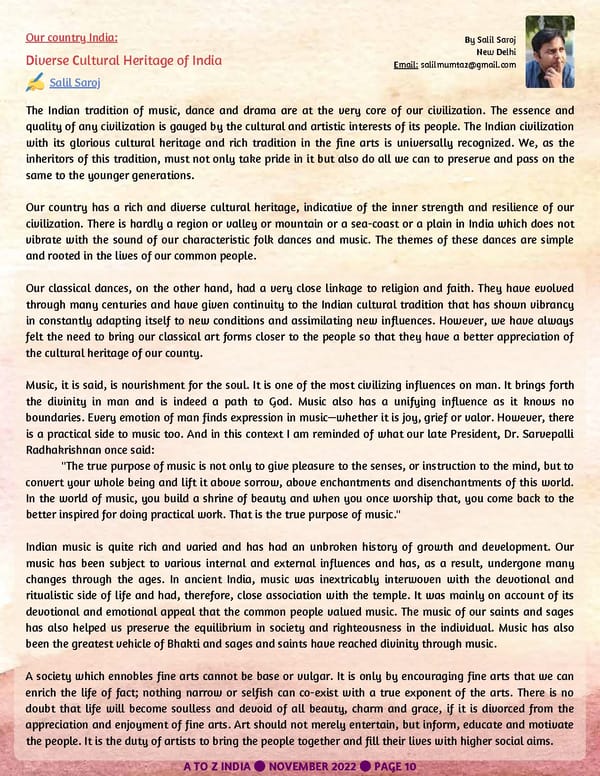Our country India: By Salil Saroj Diverse Cultural Heritage of India New Delhi Email: [email protected] Salil Saroj The Indian tradition of music, dance and drama are at the very core of our civilization. The essence and quality of any civilization is gauged by the cultural and artistic interests of its people. The Indian civilization with its glorious cultural heritage and rich tradition in the fine arts is universally recognized. We, as the inheritors of this tradition, must not only take pride in it but also do all we can to preserve and pass on the same to the younger generations. Our country has a rich and diverse cultural heritage, indicative of the inner strength and resilience of our civilization. There is hardly a region or valley or mountain or a sea-coast or a plain in India which does not vibrate with the sound of our characteristic folk dances and music. The themes of these dances are simple and rooted in the lives of our common people. Our classical dances, on the other hand, had a very close linkage to religion and faith. They have evolved through many centuries and have given continuity to the Indian cultural tradition that has shown vibrancy in constantly adapting itself to new conditions and assimilating new influences. However, we have always felt the need to bring our classical art forms closer to the people so that they have a better appreciation of the cultural heritage of our county. Music, it is said, is nourishment for the soul. It is one of the most civilizing influences on man. It brings forth the divinity in man and is indeed a path to God. Music also has a unifying influence as it knows no boundaries. Every emotion of man finds expression in music—whether it is joy, grief or valor. However, there is a practical side to music too. And in this context I am reminded of what our late President, Dr. Sarvepalli Radhakrishnan once said: "The true purpose of music is not only to give pleasure to the senses, or instruction to the mind, but to convert your whole being and lift it above sorrow, above enchantments and disenchantments of this world. In the world of music, you build a shrine of beauty and when you once worship that, you come back to the better inspired for doing practical work. That is the true purpose of music." Indian music is quite rich and varied and has had an unbroken history of growth and development. Our music has been subject to various internal and external influences and has, as a result, undergone many changes through the ages. In ancient India, music was inextricably interwoven with the devotional and ritualistic side of life and had, therefore, close association with the temple. It was mainly on account of its devotional and emotional appeal that the common people valued music. The music of our saints and sages has also helped us preserve the equilibrium in society and righteousness in the individual. Music has also been the greatest vehicle of Bhakti and sages and saints have reached divinity through music. A society which ennobles fine arts cannot be base or vulgar. It is only by encouraging fine arts that we can enrich the life of fact; nothing narrow or selfish can co-exist with a true exponent of the arts. There is no doubt that life will become soulless and devoid of all beauty, charm and grace, if it is divorced from the appreciation and enjoyment of fine arts. Art should not merely entertain, but inform, educate and motivate the people. It is the duty of artists to bring the people together and fill their lives with higher social aims. A TO Z INDIA NOVEMBER 2022 PAGE 10
 A TO Z INDIA - NOVEMBER 2022 Page 9 Page 11
A TO Z INDIA - NOVEMBER 2022 Page 9 Page 11